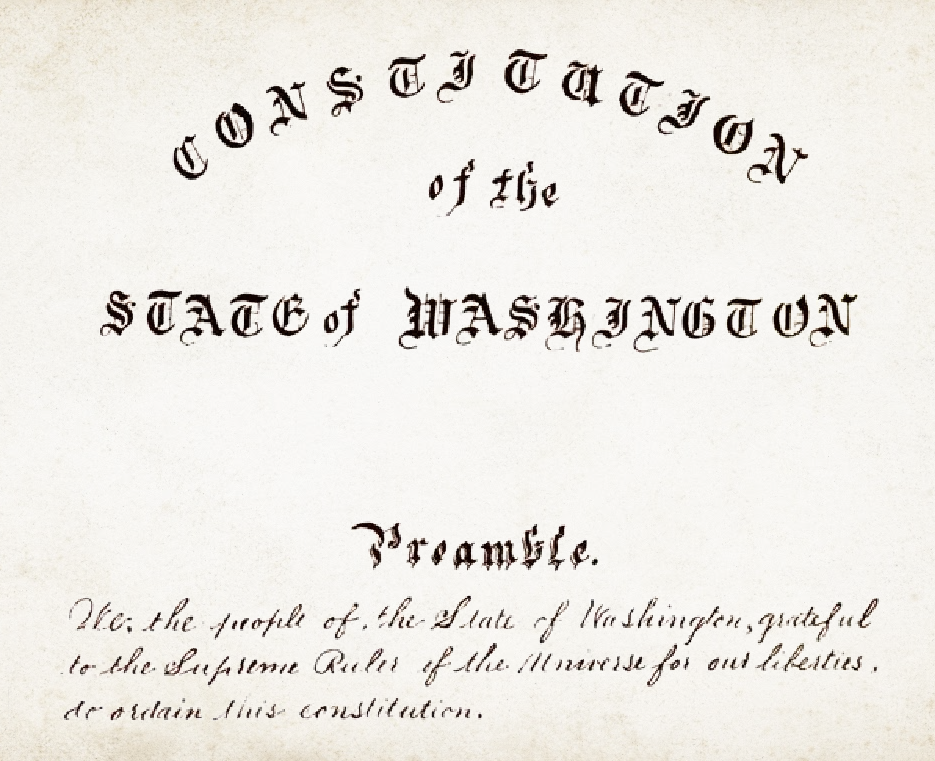OLYMPIA – “No person shall be eligible to the legislature who shall not be a citizen of the United States and a qualified voter in the district for which he is chosen,” reads Article 2, section 7 of the Washington state constitution. And yet, last year, a record 68 Washington state legislators were women. Do women representatives not have to be a qualified voters in their district? Are these 68 women not technically legislators?
Washington has a long tradition of women legislators. From 1993 to 2004, Washington had the most female representation of any statehouse in the country. While other states have surpassed us since then, Washington still has the fourth highest percentage of women members. Despite this proud tradition, the Washington state constitution is littered with outdated phrasing that is both confusing and unwelcoming for over half of the population of the state. Other problematic lines state that the accused has the right to “meet the witnesses against him face to face;” that bills will become law without a Governor’s action within 5 days of a bill being “presented to him;” and that any judge or attorney general who is removed from office must be served with “a copy of the charges against him.”
 “The time has come to update Washington’s constitution and bring it into the 21st Century. Washington has a long and proud history of women serving in elected office. There really is no reason besides process that our constitution contains so many gendered terms,” said Rep. Bill Ramos, D-Issaquah, Chair of the House State Government and Tribal Relations Committee.
“The time has come to update Washington’s constitution and bring it into the 21st Century. Washington has a long and proud history of women serving in elected office. There really is no reason besides process that our constitution contains so many gendered terms,” said Rep. Bill Ramos, D-Issaquah, Chair of the House State Government and Tribal Relations Committee.
Earlier today, Ramos introduced House Joint Resolution 4208, a constitutional amendment to remove gendered language from the Washington constitution. The amendment includes over 100 changes to the constitution changing or removing any reference to “he, him, or himself” and replacing them with either title of office or a gender-neutral term. The amendment requires a 2/3 vote of both the Washington House of Representatives and the State Senate. If it clears that bar, it will be put on the ballot, where voters must approve it.
As of 2023, the constitutions of four states—California, Hawaii, New York, and Vermont—are entirely gender-neutral. Washington would join South Dakota as states that have recently worked to remove gender from their constitutions. In its 2023 legislative session, the South Dakota Legislature passed an amendment to remove gender from their constitution with the State Senate unanimously supporting the measure and over 80 percent of the House of Representatives approving. It will go before the voters in 2024.
“I think the main reason we haven’t taken this antiquated language out of the constitution is the time and effort it requires to amend the constitution,” said Ramos. “While many might see this as a symbolic exercise, I think it is vital that our governing document reflects the reality of our state. I look forward to working with my colleagues to bring this amendment forward and updating our constitution to include all Washingtonians.”
The amendment is also supported by the League of Women Voters of Washington.
“The League of Women Voters of Washington appreciates the value of inclusive language. The League believes that the state constitution should be brief, concise, flexible, clear, and free of obsolete provisions. Removing obsolete language of yesteryear, that represented everyone with male pronouns, will bring our constitution into the 21st century. It will also create a more readable document easier for all to access and use. The League urges bipartisan support of this limited venture into amending our constitution so that it is inclusive of all people,” said Mary Coltrane, President of the League of Women Voter’s of Washington.
The first day of the 2024 legislative session is January 8, 2024. This short, non-budget year session should wrap up by March 7th. The earliest the amendment could go on the ballot would be during the 2024 general election.
###
